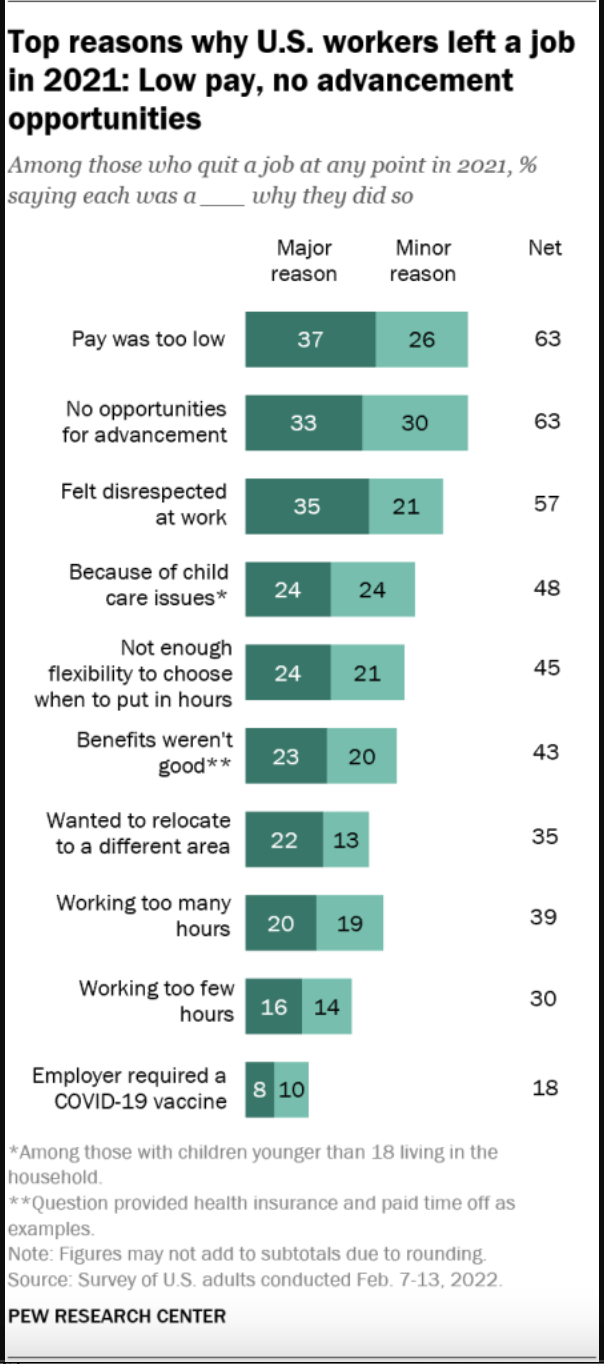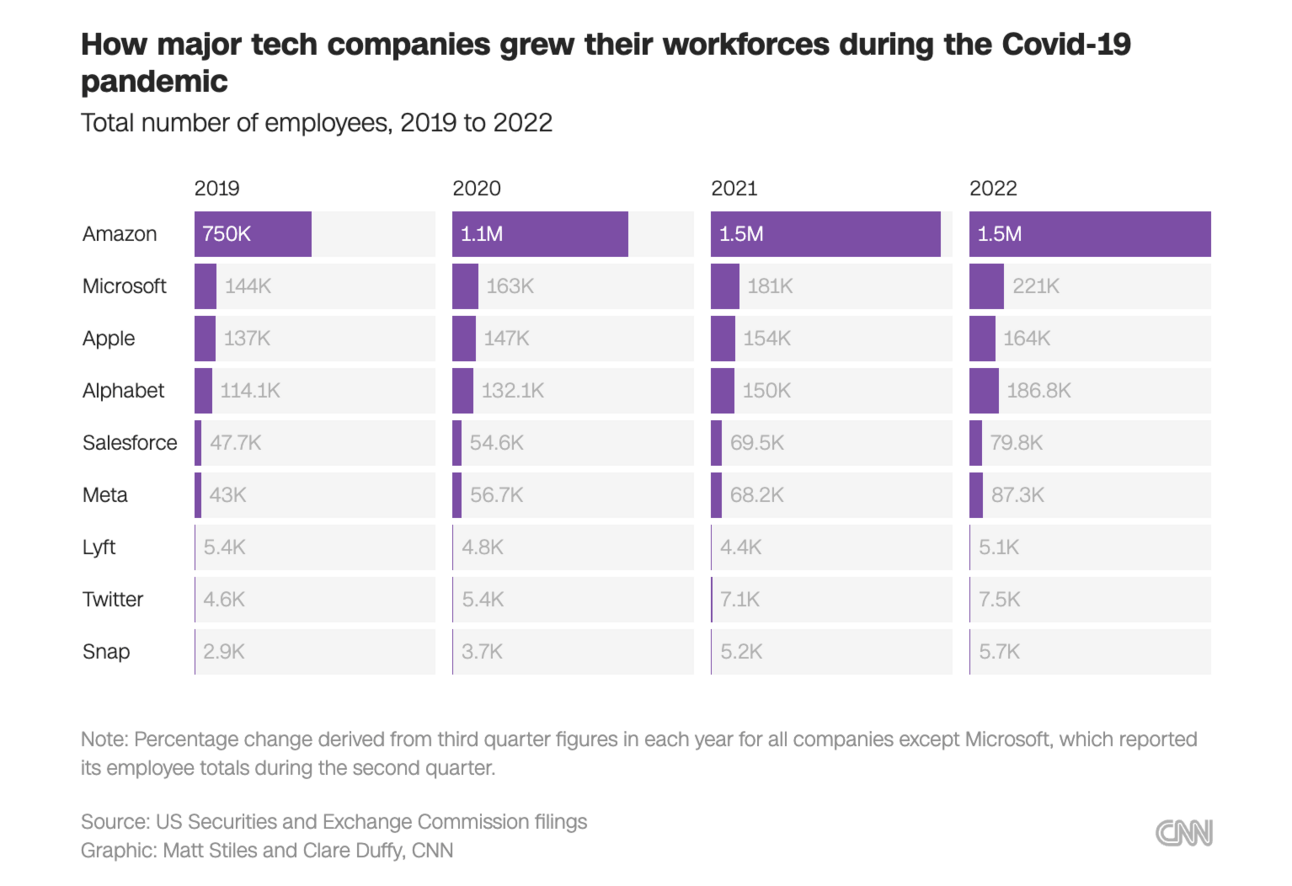Welcome to The Level Ups, modern business news for the future business leader (in plain-Jane English).
In 2022, 50.5M people quit their jobs in the “Great Resignation.” Most got other jobs, some found yoga, and a few started their own business.
But, it looks like it’s come to an end. Did a bad economy slap sense into people, or is yoga just overrated?
Today, we cover:
History of the Great Resignation.
The latest numbers.
What this means for the rest of us.
Let’s get into it.
Estimated reading time: 4 minutes & 20 seconds.
The Great Resignation.
It’s exactly what it sounds like.
From the start of the pandemic until recently, a record number of employees quit.
But why so many, and at that particular time?
The reasons included money and career growth, the two major factors (”disrespect at work” was #3). Here’s the full list:

At least, that’s what people say on surveys. We may never know the whole story. Regardless, it’s the largest departure from work in over 20 years.
Now, before getting into further details, let’s review this matter today.
A few key reasons:
Understanding these events will help us make sense of today’s economic climate (which is not great).
Knowing how we got here will help us navigate the next six months of economic difficulty.
It will help reduce some fear and anxiety about the current economy.
I’ll keep it quick, but trust me, it’s worth reading.
Why all the resignations?
A few major factors:
During the pandemic, the government gave people money (stimulus cheques, CERB, etc). Simply put, it’s easy to quit if some money will come from elsewhere (in most cases).
Some companies did well during the pandemic. Especially tech companies (some of which doubled their employee count from 2019 to 2023). So there were jobs elsewhere.
Considering the money coming from elsewhere, tons of job openings, and very low interest rates, people quitting (at that specific time) makes some sense.
Printing money and keeping interest rates low likely created many of our current issues, but that’s a story for another time.
But, there’s another major factor most people ignore.
Let’s say your company promotes you to a manager position that pays $100,000/year. Amazing!
Did you know that someone else hired from outside the company, doing the exact same job, would make around $118,000 - $125,000? It’s true.
Isn’t that so annoying? No wonder people quit and get a job somewhere else.
Is it over?
For better or worse, yes, the Great Resignation is over (based on numbers from July and August 2023).
The US Bureau of Labor Statistics releases a Job Openings and Labor Turnover (JOLTS) Report that covers the details.
You can find the August report here. July was a similar story.
Job openings fall to the lowest since 2021.
Interest rates are high, so getting by with a line of credit is much harder.
The government funding ended.
Quitting fell to pre-pandemic levels.
To give you a sense of how aggressive these raises were, the US government specifically made it harder for businesses to keep raising salaries. This was out of fear that businesses would also increase inflation by doing so.
It’s messed up that the government actively works against companies giving raises, but there’s probably more to the story (for another time).
And just to be clear, this wasn’t just about white-collared works in tech and finance:
There was a mix of people with post-graduate degrees, university degrees, and high school diplomas.
Low-income employees had the highest quitting rate (24%) compared to high-income earners (11%).
The biggest group who quit was young people. 37% of young people (under 30) quit their jobs during the Great Resignation.
And again, it’s over, but it wasn’t just for a small group of tech people. It was a big deal, and we have to look at what’s next.
The downturn:
Obviously, the economy has changed a lot.
Very high interest rates are an issue (Canadians have had ten rate hikes in eighteen months).
There are fewer job openings.
Global conflict affects supply chains and markets generally.
Company layoffs, even in the tech industry.
But, it’s not all doom and gloom.
In the same tech industry, from 2019 to 2023, Microsoft (just one example) added approx. 700,000 new jobs.

But, so far in 2023, they’ve announced two rounds of layoffs (in January and March) for 21,000 layoffs.
While layoffs are never a good story, they’ve still added several hundred thousand jobs in the big picture. Same for Meta (looking at the same chart).
It’s a drop in the bucket, at least so far.
A changing workforce:
While the Great Resignation is over, that doesn’t mean it’s all smooth sailing.
Companies are smartening up. As we’ve seen in tech, hiring full-timers while dealing with uncertain economic futures, quiet quitting, and burned-out employees is a major risk.
Hiring project-based workers, independent contractors, and part-time positions. Avoiding W2 and T4 employment.
Looking overseas to hire less expensive talent.
More responsibility with managers to help protect companies from resignations and avoid over-hiring.
Tackling AI with transparency (especially in recruiting).
During a downturn, it’s never an “easy ride.”
As much as governments work to create a “soft landing” with as little major damage as possible, the reality is that it’s not going to be easy. We’ve been talking about a recession for years.
So, what are we supposed to do?
What it means for the rest of us.
The ending of the Great Resignation is a wake-up call.
It comes back to fear:
Fear of losing our jobs.
Of what’s going to happen with our small businesses.
For big companies: it’s how investors evaluate a business during a downturn.
When companies see massive growth, few care about profits. The Verge explains this in detail.
But that reality has changed. Investors are looking for profits, and unfortunately, company leadership often resorts to layoffs because salaries are typically the highest expense.
Layoffs help them show:
They’re doing something to make investors feel better.
Reductions in expenses before their next quarterly report.
Then it becomes a cycle.
As companies worry about their expenses, they spend less. Other companies selling those goods and services make less money. The cycle continues.
During the pandemic, the governments made interest rates near zero (as covered above), making it easier to get by.
But now, it’s the opposite. Companies can’t use their line of credit to get by as easily as they used to.
It’s hard on everyone. Conventional wisdom would suggest making a budget, cutting personal expenses, and making adjustments with your bank to keep interest low.
We’re not here to give financial advice, so do your research (with more than just the one article above).
But remember, just as the Great Resignation was temporary. The downturn will be temporary as well. Typical recessions last less than a year. In the big picture, that’s not the worst.
On the flip side, the most successful businesses of our time were created during recessions.
Maybe it’s time to consider adding a small income on the side.
Something to think about.
Thanks for reading!
What did you think of this email?
PS - thanks for waiting. We took last week off due to illness. Feeling better now!

